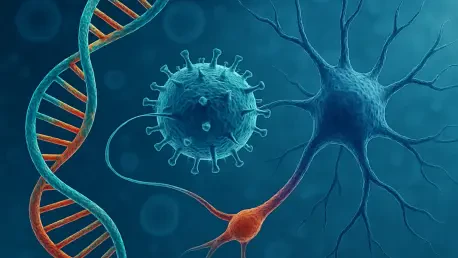I’m thrilled to sit down with Ivan Kairatov, a renowned biopharma expert with extensive experience in research and development, and a deep understanding of technological innovation in the industry. Today, we’re diving into the groundbreaking progress of gene therapy, specifically focusing on UniQure’s recent advancements with AMT-130, a potential treatment for Huntington’s disease. Our conversation explores the promising results from their latest study, the unique approach of this therapy, the impact on patients, and what lies ahead in the journey toward approval and beyond. Let’s get started.
How did UniQure’s latest Phase 2 study results for AMT-130 reshape the outlook for treating Huntington’s disease?
The recent Phase 2 study results for AMT-130 are incredibly exciting. UniQure reported a 75% slowing of disease progression after three years in patients who received the highest dose. This is a remarkable outcome, especially for a condition like Huntington’s, which is progressive and currently has no cure. The data, though from a small group of 12 patients, exceeded expectations and suggests that AMT-130 could significantly alter the course of the disease, offering hope for a better quality of life over a longer period.
Can you break down the significance of a 75% reduction in disease progression for patients and their families?
Absolutely. A 75% slowing means that the relentless decline typically seen in Huntington’s disease—impacting movement, cognition, and daily functioning—could be delayed substantially. For patients, this translates to potentially years of maintaining independence and engaging in meaningful activities. One expert involved in the study even suggested it could equate to four additional disease-free years for every year of progression. For families, this offers more time with their loved ones in a healthier state, which is invaluable both emotionally and practically.
What is it about AMT-130 that sets it apart from other treatments being explored for Huntington’s disease?
AMT-130 is unique because it’s a gene therapy that directly targets the root cause of Huntington’s disease at the genetic level. It works by silencing the gene responsible for producing a mutant form of the huntingtin protein, which damages nerve cells. Unlike many symptomatic treatments that only manage the effects, AMT-130 aims to halt or slow the underlying damage. This approach is a significant departure from other therapies, which often don’t address the genetic driver of the disease, making it a potential game-changer if proven effective at scale.
Could you walk us through how the study was designed and what the key data points tell us?
The study involved 29 participants, with a focus on 12 patients from the high-dose group who had at least 36 months of follow-up. UniQure compared their disease progression to an external control group from a large longitudinal study called Enroll-HD, which included similar patients not receiving the therapy. Using a well-established scale for Huntington’s progression, the treated group showed an average score increase of just 0.38 points compared to 1.52 points in the control group—a 75% difference. This stark contrast highlights the therapy’s potential to slow the disease’s impact significantly.
How might this slowing of progression translate into real-world benefits for someone living with Huntington’s disease?
In practical terms, slowing progression by 75% could mean a patient retains motor skills, like walking or eating independently, for much longer. It could also delay cognitive decline, allowing them to maintain relationships and make decisions with clarity for an extended period. Essentially, it’s about preserving dignity and autonomy. The idea of gaining years of relatively stable health can transform how patients and families plan for the future, reducing the burden of rapid deterioration.
What are the upcoming milestones for UniQure as they move forward with AMT-130?
UniQure is planning to meet with the FDA by the end of this year to discuss these compelling results. The focus will likely be on the data’s implications and the path to approval. They’re aiming to file an application in 2026, which means the next couple of years will involve gathering additional data, refining their submission, and potentially addressing any regulatory feedback. There’s also talk of special designations that could expedite the review process, possibly leading to approval by late next year if all goes smoothly.
What is your forecast for the future of gene therapies like AMT-130 in transforming neurodegenerative diseases?
I’m incredibly optimistic about the trajectory of gene therapies for neurodegenerative conditions. AMT-130’s results are a strong signal that we’re on the cusp of a new era where we can tackle these diseases at their genetic roots, not just their symptoms. Over the next decade, I expect we’ll see more therapies like this gaining traction, with improved delivery methods and broader applications. The challenge will be ensuring access and affordability, but the science is moving fast, and the potential to change lives is immense.









